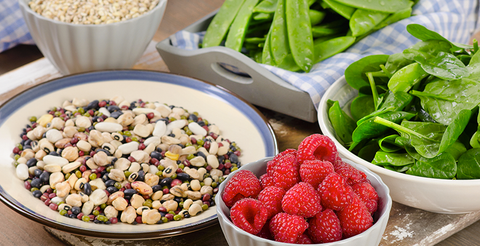As women, we are many things to many people – daughter, sister, partner, friend, colleague..the list goes on. We’re often stressed, and secretly feel like we are constantly letting people down. We barely have time to care for ourselves in the busy-ness that we encounter every day. And this leads to unhealthy eating habits, a lack of exercise, and guilt, guilt, guilt.
Image source: Spice4Life
But the truth is, the only way we can effectively be all those things to all those people is by learning to care for ourselves first. Literally.
What if we could get the most important nutrients into our bodies by breakfast time? We’d have less worry, less guilt, and more time to care for the people in our lives.
Sound impossible? Read on!
Calcium
Image source: Eat Right Ontario
Isn’t calcium just important for kids and older women? No! We deposit calcium in our bones up to age 30, at which point our bones start to lose calcium faster than we can put it in. Eating enough calcium ensures that we achieve the best bone mass we can by age 30. It also slows the rate at which we lose bone mass as time goes on.
Let’s talk breakfast:
The most efficient source of calcium is dairy (milk, yogurt, and cheese). If you’re lactose intolerant, look for calcium-enriched soy/almond/rice milk. If you’re a savoury person, try adding tofu into your scrambled eggs (or just scramble tofu on its own!).
Iron
Image source: Nigeria Today
Iron is needed for the transport of oxygen around our bodies. Because iron is mostly found in our red blood cells, women who are of menstruating age regularly lose iron every month. If this iron is not regularly replenished, we can be left feeling tired and lethargic – one of the most common symptoms of inadequate iron.
Let’s talk breakfast:
While meat is the most common source of iron in a regular diet, we don’t typically eat much meat for breakfast. Instead, consider eating iron-fortified cereals and dried fruit like raisins and apricots. Or, whip up a smoothie using dark green leafy vegetables like spinach and kale.
Vitamin C
Image source: The CrossFit Side
Vitamin C is a wonder vitamin, helping to boost immunity, keep skin looking young and healthy (think collagen!), and fight oxidative damage in the body. Also, when taken with a source of iron (see above), it actually helps your body absorb the iron better!
Let’s talk breakfast:
Fruits are the most common sources of Vitamin C. Simply top your cereal or smoothie with fresh fruit (citrus fruits, guava, and kiwis are especially rich in Vitamin C), or have a piece of fruit on the side. If you’re going savoury, add capsicum, tomatoes, or spinach to whatever you’re cooking, and you’re good!
Omega-3
Image source: medstaffers.net
Omega-3 is known as a “good” fat, for a reason. It is known to protect against heart disease and cancer – both of which are leading causes of death for women in Asia. In addition, Omega-3 is essential in the development of babies’ brains – making it especially important for women of childbearing age.
Let’s talk breakfast:
Flax seeds are the richest source of Omega-3 – and they are easy to toss into any breakfast! Add a spoonful to your cereals, smoothies, or granola bowls, and you’re done! Other good breakfast sources are avocados, salmon, and walnuts!
Fiber

Image source: nutrilett.com
Fiber helps with weight and appetite control, stabilizing blood sugars, and maintaining good bowel health. Fiber has also been linked to heart health, as a type of fiber (called soluble fiber) can help to reduce cholesterol levels.
Let’s talk breakfast:
Breakfast is a great opportunity to get fiber into your system! Reach for unrefined grains (like oats, buckwheat, quinoa), fresh or dried fruits, nuts, and even vegetables to add some fiber into your day. That way, you can worry less if your lunchtime bowl of noodles has only a few strands of vegetables in it!

Image source: Young and Raw
Let’s begin putting ourselves first and getting in a nutrient-rich breakfast to start the day! Only then can we better be there for the people who need us daily.
Curious about the most important nutrients in a man’s diet? Read about it here!





